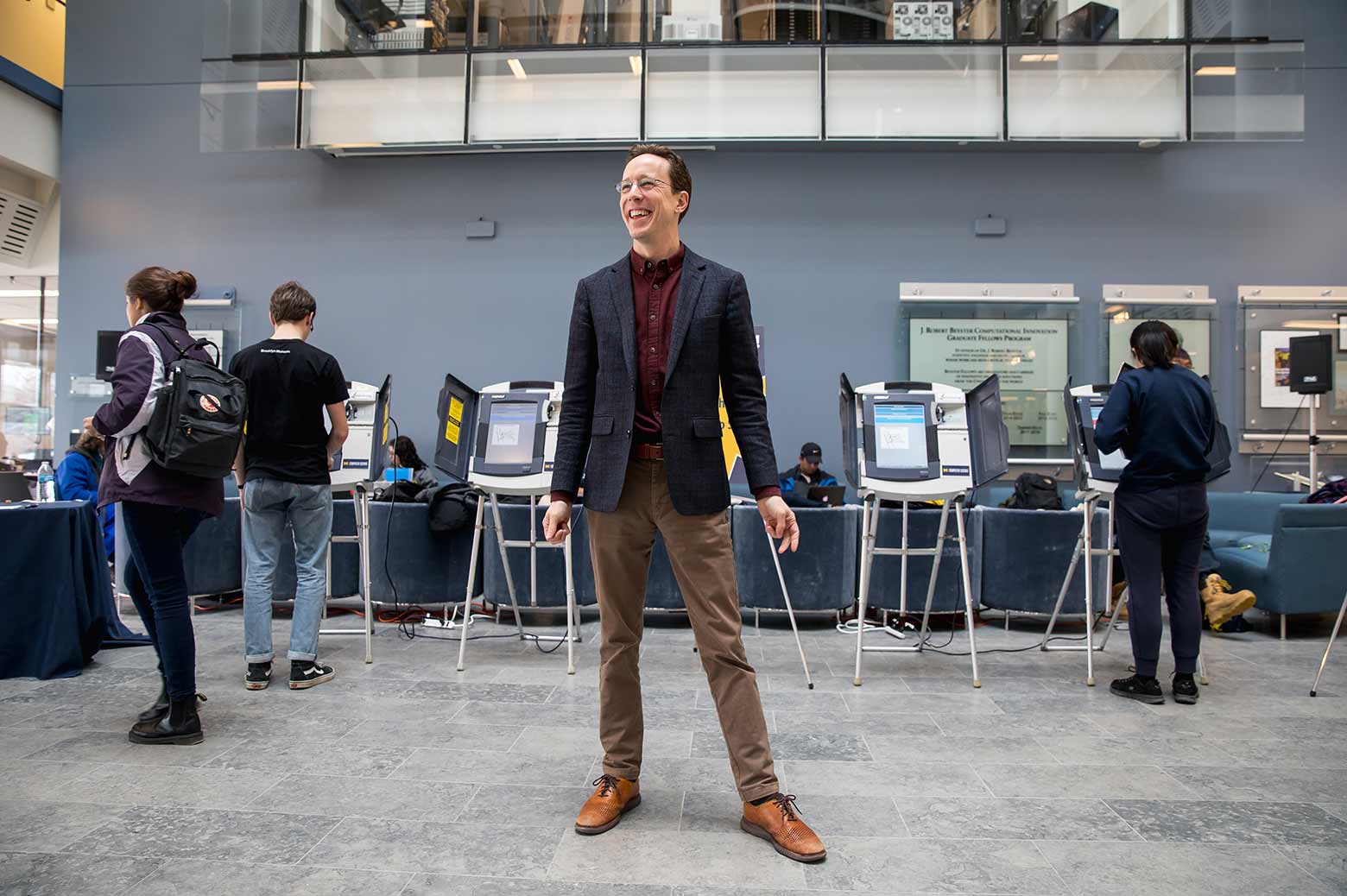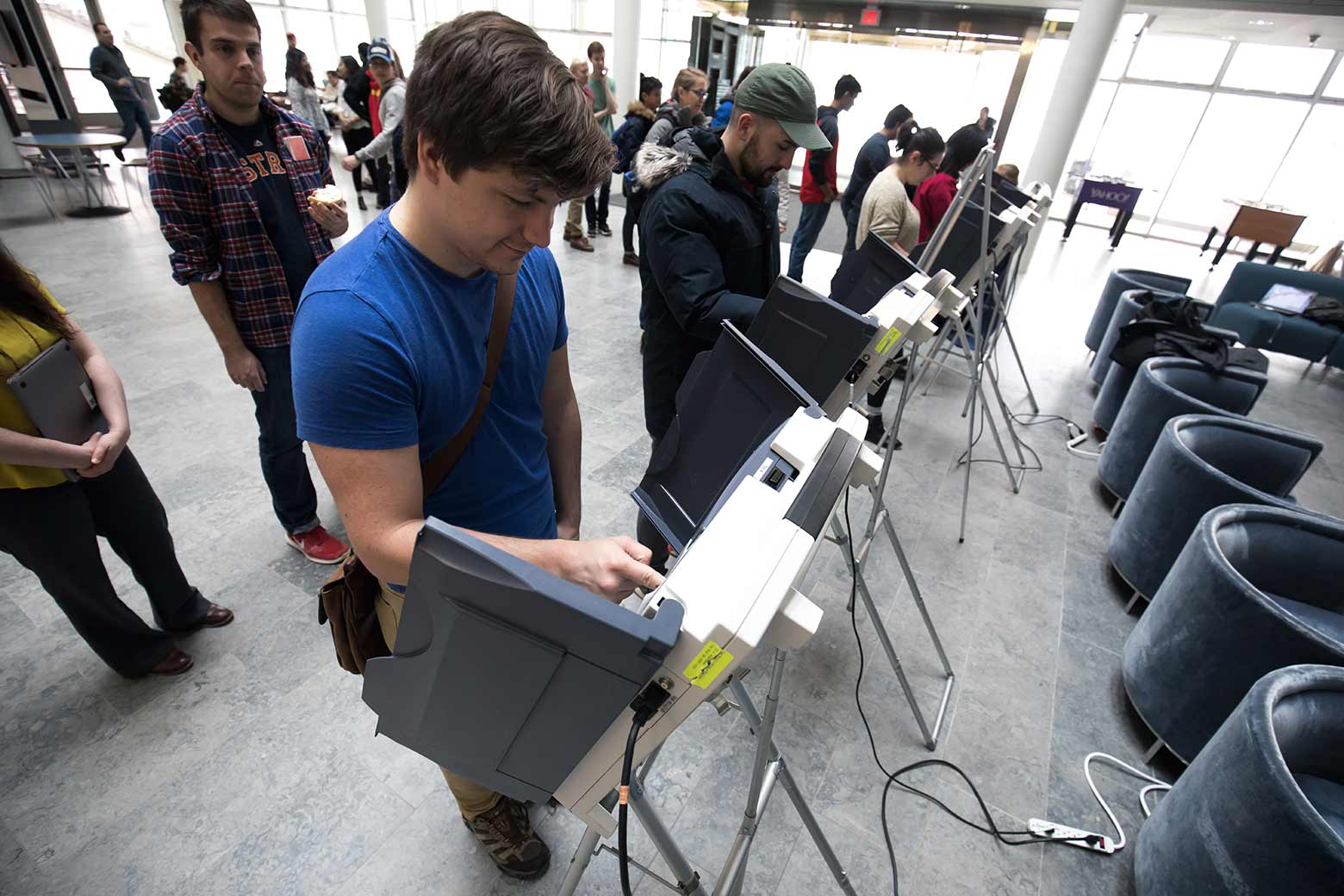‘I hacked an election. So can the Russians.’
Professor Alex Halderman and the New York Times staged a mock election to demonstrate voting machine vulnerability.

 Enlarge
Enlarge
A row of voting machines purchased on eBay lined Tishman Hall one winter morning. These were archetypes of the very same equipment used today in many states—Georgia, and parts of Indiana, Kansas, Kentucky, Mississippi, Tennessee, Texas, Virginia, Florida and Pennsylvania.
Students cast ballots for the “greatest university”—the University of Michigan or Ohio State.
Unbeknownst to the voters, the machines had been hacked by a likely culprit: J. Alex Halderman, professor of computer science and engineering who routinely uses hacking to demonstrate how vulnerable electronic voting actually is. He has turned a voting machine into a PacMan game and famously hacked a mock election in DC several years ago, changing votes to famous robots.
Halderman worked with the New York Times editorial department to produce the video: I hacked an election. So can the Russians. In it, he explains how he did it.
“After the chaos of the 2000 election, we were promised a modern and dependable way to vote,” Halderman says in the video. “I’m here to tell you that the electronic voting machines Americans got to solve the problem of voting integrity, they turned out to be an awful idea. That’s because people like me can hack them all too easily.
“Our highly computerized election infrastructure is vulnerable to sabotage and even to cyberattacks that could change votes.”

 Enlarge
Enlarge
Halderman has testified before Congress on the issue. He says that while it’s promising that the Senate Intelligence Committee has recently shown some understanding of the problem, states must act too.
He advocates for back-up paper ballots that could make true audits possible. It’s a system that President Trump also supports.
“In a real election an official could quickly scan these paper ballots and shortly after have a human verify the results,” Halderman says in the video.
In the Media
How to hack an election
EECS-CSE professor Alex Halderman discusses voting machine vulnerabilities ahead of midterm elections.
The midterms are already hacked. You just don’t know it yet.
EECS-CSE professor Alex Halderman and grad student Matt Bernhard discuss election security risks with Vox.
The campaign for mobile-phone voting is getting a midterm test
EECS-CSE professor Alex Halderman discusses election security ahead of midterms.
How hackable are American voting machines? It depends who you ask
EECS-CSE professor Alex Halderman discusses voting machine vulnerabilities ahead of the midterm elections.
How to hack an election—and what states should do to prevent fake votes
EECS-CSE professor Alex Halderman presented his election hacking findings at MIT Technology Review’s EmTech conference.
Is Trump taking on Russia? President authorizes sanctions on countries that interfere in elections
EECS-CSE professor Alex Halderman says if Russia plans to interfere in U.S. midterms, they’re probably already in our election systems.
Security upgrades are too little, too late for 2018 midterms, and race is already on for 2020, experts say
EECS-CSE professor Alex Halderman discusses election security with Newsweek.
Why election security experts really like paper records
EECS-CSE professor Alex Halderman talks election security with Marketplace Tech host host Tracey Samuelson.
Sounding the alarm on the dangers of electronic voting
EECS-CSE professor J. Alex Halderman discusses electronic voting and hacking vulnerabilities with Bloomberg News.
 MENU
MENU 
